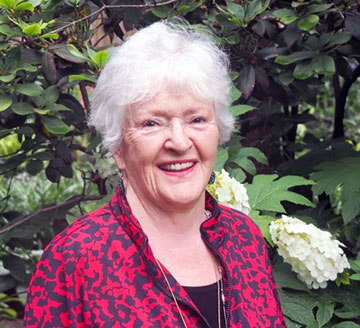When God Puts Something on Your Heart, You Have To Do What God Says
Posted on July 1, 2019, by Leslee Moore CoL

Retirement” means different things to different folks. For some, it is an opportunity to travel; for others, a chance to pursue a long-neglected hobby or to discover a new one. For Judy McLaughlin, it meant co-founding a shelter for those with nowhere else to go.
Burning desire for social justice work
In 1997, Judy retired as the division chairperson of the Natural Sciences and Health Technologies department at Lexington (Ky.) Community College. She had time on her hands and a burning desire for social justice work, so she contacted Ginny Ramsey, then the head of the Peace and Justice Committee at the Cathedral of Christ the King in Lexington, Ky., and offered her services. The committee was an active one, sponsoring seminars and talks, including one by Sister Helen Prejean, to try to draw in other parishioners. While this was satisfying work, it wasn’t enough. Judy and Ramsey, along with a few others, had read Dorothy Day’s books and knew there was much more to be done. So, they got busy.
‘An odor of failure’ in the neighborhood
Their first step was to visit the lowest income area in Lexington, located on the northeast side of downtown. “There was an odor of failure there. So many of the people living there had so many problems, including mental illness, physical disabilities and functional illiteracy,” Judy remembers. There was also a significant amount of homelessness. Folks didn’t have a place to stay, but they did have connections to the neighborhood, so they didn’t want to leave, she said.
Perseverance pays off in mission to homeless
Next was finding a suitable building to use as a shelter. A four-family flat had been abandoned by a church that could no longer afford the upkeep on the building. It had bullet holes in the windows, a leaking roof, bad plumbing, a kitchen that required a complete re-do and red shag carpeting that was well past its expiration date; and the building had only one exit, which meant Judy and Ramsey could no longer use the place as apartments. But, none of this deterred the women. They fixed the roof and the plumbing, named Ramsey the executive director, and put the utilities in Judy’s name. They called it a mission for those who were homeless and served free meals, peanut butter sandwiches and water until they could fix the kitchen, including the procurement of a used commercial range, refrigerator/freezer and the installation of a ventilation system over the range that ended up costing $25,000. Coded locks had to be added to the doors to prevent theft of the food. Drugs were being sold openly across the street, and a bar, also across the street, provided for “riotous occurrences,” as Judy relates. Still, they persevered.
Since opening its doors in June 2000, the Catholic Action Center has served more than 5 1/2 million meals, provided 900,000 nights of shelter and has held more than 90 funerals for those who had no one else to mourn their loss.
A shelter for women with nowhere to go
Three years later, the women bought a nearby building, calling it St. Ann’s, and they turned it into a shelter for women with nowhere to go; on the streets, they were considerably more vulnerable than their male counterparts. When asked what they needed most, the women said a mailbox to which they could have mail delivered, showers, clothes and a public telephone. Judy and Ramsey made it happen.
Initially, the neighborhood was not particularly welcoming to the new Catholic Action Center (CAC), which, by now, was serving lunch and dinner every day, and providing a place for folks to get out of the weather. There were games, newspapers and a television at the center. Because city officials told the center that they could not be called a church because there was insufficient parking, it initially fell under the auspices of a local downtown parish in Lexington. In that way, the center could continue to offer hospitality, which now included Bible study and the occasional itinerate preacher. Ramsey and Judy were affectionately known as the white church ladies, and the mission continued to grow.
CAC provides community of hospitality, safety and acceptance
The Catholic Action Center grew over the years, overcoming obstacles posed by city ordinances. In April 2017, in part to settle a lawsuit between the city and the center, the Catholic Action Center moved to its current location on Industry Road in Lexington. It is now a 24-hour center that provides shelter for men and women, “providing a community of hospitality, safety and acceptance for those looking for a path from the streets to a home, giving an opportunity for the community to reach out to those who are disenfranchised, voiceless and left out of social service systems, and needing to experience the acceptance, accountability and love of a community while receiving the basic needs of food, shelter and connection to services,” as the CAC website states. Since opening its doors in June 2000, CAC has served more than 5 1/2 million meals, provided 900,000 nights of shelter and has held more than 90 funerals for those who had no one else to mourn their loss.
Although Judy is no longer there every day, she can still be found at the Catholic Action Center several times each week. Whether serving a meal, helping with bingo, or offering a listening ear, Judy’s love for her guests has never diminished. A former guest of CAC wrote her a heartfelt letter after he found a permanent place to live. He was the one who told her that “when God put something on your heart, you have to do what He says.” Judy lives those words every single day.
